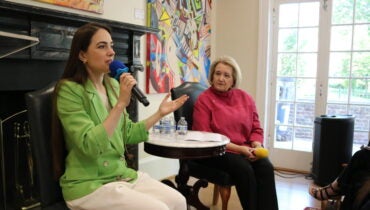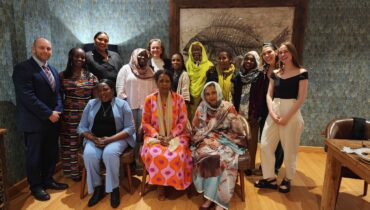Sinjar, a district in the northwest region of Iraq characterized by desert and vast sky, was home to hundreds of thousands of Yazidis, a Kurdish-speaking religious minority. Nestled in the Sinjar mountains was a small farming community—Kocho.
This is where Nobel Peace Prize Laureate Nadia Murad grew up with her 11 siblings and four half-siblings.
“We didn’t have much every day, but every day I felt that I had purpose,” said Murad.
In August 2014 the Islamic State in Iraq and Syria (ISIS), a violent extremist group, invaded Sinjar and killed over 5,000 Yazidis, enslaved over 6,000 women and children, and displaced 400,000. Many of Murad’s family members were killed, including her mother and six of her brothers. Murad was captured by ISIS. She escaped three months later, and went on to become an activist for the Yazidi community and survivors of genocide and conflict-related sexual violence. In 2018, she founded her organization–Nadia’s Initiative–and received the Nobel Peace Prize for her work.
Ten years after ISIS carried out a genocide against the her community, Murad and Nadia’s Initiative are still advocating for justice and accountability for the crimes committed against the Yazidi community and supporting the rebuilding of Sinjar so that the Yazidi people can, finally, return home.
The Georgetown Institute for Women, Peace and Security (GIWPS) and Nadia’s Initiative hosted a discussion on “Rebuilding After Atrocities: Accountability and Reconstruction in Sinjar and Beyond” on January 31 with Murad, U.S. Ambassador-At-Large for Global Criminal Justice Beth Van Schaack, and Executive Director of the Human Rights Institute at Georgetown Law Elisa Massimino. The conversation was moderated by GIWPS Executive Director Melanne Verveer.
Nadia’s Initiative also released their report, “Rebuilding Amid the Ruins” at the event, which was created in collaboration with GIWPS. It details the status of Sinjar after the devastating occupation by ISIS and the struggle of the Yazidis to rebuild and return home.
“We are building our community from the ground up, giving survivors the tools they need for decades rather than days,” noted Murad while speaking at Georgetown University.
Justice for Genocide Survivors
Very few of the ISIS perpetrators of genocide, sexual violence, and displacement of the Yazidis have been held accountable for their crimes.
“The natural place for jurisdiction…would be Iraq,” said Ambassador Van Schaack. “Iraq, however, does not have—within its domestic code—the ability to prosecute international crime.”
Iraq brings perpetrators to court under the crime of terrorism, but doesn’t have provisions to bring perpetrators to court under the crime of sexual violence or genocide.
“Survivors don’t really trust the Iraqi system,” added Murad. “Survivors are not included in the Iraqi system of accountability, and there is no transparency.”
Panelists discussed pathways to justice, including extraterritoriality. Ambassador Van Schaack explained that if a survivor of the genocide recognizes a perpetrator in their local community once they have emigrated to another country—such as Germany—they can take them to court under German law through the principle of universal jurisdiction. However, this only applies if a state has domestic genocide laws to charge the perpetrator.
Another avenue to justice is an independent investigation team formed by the United Nations Security Council in 2017, called the United Nations Investigative Team to Promote Accountability for Crimes Committed by Da’esh/ISIL (UNITAD).
UNITAD’s main goal was to promote accountability for the crimes committed by ISIS by preserving, collecting, and storing evidence to bring to the Iraqi government for national prosecutions of crimes committed ordered that the mission end in September 2024.
Survivors had already given testimony to UNITAD under the Murad Code—a survivor-centered method of documenting conflict-related sexual violence.
“We have to find ways to make that information continue to be available because these cases are still emerging, even now a decade later we’re finding and identifying perpetrators,” said Ambassador Van Schaack. “We can’t have the archives of UNITAD just end up in a basement somewhere in New York at the UN headquarters.”
The Human Rights Institute at Georgetown Law, headed by Massimino, also teamed up with Nadia’s Initiative to help develop legal mechanisms to hold members of ISIS accountable for their crimes against the Yazidi people.
“This is a long struggle and we need to be constantly feeding new energy into the fight and Georgetown is full of that, so students are really on fire to get engaged in all of these issues,” said Massimino.
Ambassador Van Schaack added that reparations and material assistance are the only ways to help survivors get back on their feet.
“I think we as an international community need to find creative ways to fund reparations so that we are delivering justice…but also enabling these survivor communities to get back on their feet, to rebuild their lives and livelihoods, to send their children to school, to rebuild their homes,” she said.
Coming Home
Along with accountability and prosecution of perpetrators, one of Murad’s main calls to action is to rebuild what was lost in Sinjar and give hope to those who are still displaced due to the atrocities committed.
Currently, 200,000 Yazidis live in displacement camps just outside of Sinjar in northern Iraq. They are unable to return home because ISIS destroyed the land, homes, schools, and health centers in order to prevent the Yazidi people from ever returning.
Murad herself spent nearly nine months in the refugee camp after her escape from ISIS. She said she felt no “purpose” there.
Now, through Nadia’s Initiative, Murad employs a survivor-centric approach to rebuilding farms, schools, and hospitals, as well as providing education, professional and vocational courses to women so that they’re less vulnerable to poverty and inequality.
“You really are the embodiment of the principles in [Resolution 1325] about the role that women must play in conflict prevention, in rebuilding. It’s just extraordinary what you’ve been able to do against so many odds,” said Massimino.
Murad has become a leading advocate for survivors of genocide and sexual violence. Along with being awarded the Nobel Peace Prize, she also became the first Goodwill Ambassador for the Dignity of Survivors of Human Trafficking. GIWPS awarded Murad with the Hillary Rodham Clinton Award for advancing Peace and Security in 2018.
Reminding us of the importance of the Women, Peace and Security agenda and normalizing a focus on women’s protection and participation, Ambassador Verveer commented, “a lot of what we’re talking about, particularly what’s happening to survivors is part of a bigger context that really goes back to the status of women in our societies and what allows these kinds of atrocities to occur in the first place.”
Murad concluded the discussion with a message of hope:
“I am healing and I am recovering, but I also have hope that we can have a better world if we work together,” she said.

